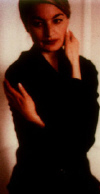

|
>>> 09/01/02 "What is life? A frenzy. What is life? An illusion, a shadow, a fiction. And the greatest good is of slight worth, as all life is a dream." -- Pedro Calderon de la Barca (1636) , F O R M , W O R D S ; W O R D S , F O R M , L A N D S C A P E ; L A N D S C A P E , F O R M (S) , W O R (L) D S . ___________________________________________ signature and date >>>>>>>>>>>>>>>>>>>>>>>>>>>>>>>>>>>>>>>>>> (notary's seal) THE SMALL PRINT "form, n. [F. forme, fr. L. forma.] - 1. An image; likeness. Obs. 2. The shape and structure of anything; configuration; figure. 3. a A body, esp. of a human being. b Pleasing external appearance; beauty. Archaic. 4. One of the different modes or aspects of existence, action, or manifestation of the same thing or substance; a kind; variety; as, graphite, soot, and the diamond are forms of carbon. 5. Specif., Gram., one of the different aspects a word may take as a result of inflection or change in spelling or pronunciation; as, an obsolete form; participial forms; verbal forms. 6. A manner or method, esp. as regulative or prescriptive; as, a matter of form. 7. a Conduct regulated by custom, etiquette, etc.; often, mere empty ceremony; hence: a formality, ceremony, or conventionality; as, social forms. b Manner or conduct as tested by a prescribed standard; as, such behavior is very bad form. Society Cat. c Manner of performing something. 8. Physical or mental condition; esp., fitness to do anything; condition; as, an athlete or race horse is in or out of form or in bad form. Sporting or Colloq. 9. The ideal or intrinsic character of anything; hence, a pattern or schema; specif., Metaph., that assemblage or disposition of qualities which makes a conception, or that which makes an existing thing, to be what it is; - called essential or substantial form [...]" -- Webster's Collegiate Dictionary (Thin Paper Edition De Luxe, 1935) "Flaubert's published letters - especially those to Louise Colet about the writing of Madame Bovary - are some of the most fascinating accounts of the writing process that exist. He tells her he is 'two distinct persons: one who is infatuated with bombast, lyricism, eagle flights, sonorities of phrase and lofty ideas; and another who digs and burrows into the truth as deeply as he can, who likes to treat a humble fact as respectfully as a big one, who would like to make you feel almost physically the things he reproduces.' And early in the writing of the novel he says 'The entire value of my book, if it has any, will consist of my having known how to walk straight ahead on a hair, balanced above the two abysses of lyricism and vulgarity (which I want to fuse in a narrative analysis.) When I think of what it can be, I am dazzled.' He wrote also that his new novel would be 'a book about nothing, a book dependent on nothing external, which would be held together by the external strength of its style, just as the earth, suspended in the void, depends on nothing external for its support; a book which would have no subject, or at least in which the subject would be almost invisible, if such a thing is possible.' He was both excited and exhausted by the difficulty of the enterprise - Bovary, he told Louise in July 1852, 'will have been an unprecedented tour de force (a fact of which I alone shall ever be aware): its subject, characters, effects etc. - are all alien to me. Writing this book I am like a man playing the piano with lead balls attached to his knuckles.'" -- A. S. Byatt on Gustav Flaubert's Madame Bovary (The Guardian Unlimited, 07/27/02) "At the beginning of time Before there were waves We'd sit in our boats We'd float there all day" -- Jane Siberry (Wing-It Music, 1993)  The following pages are extracted/reformulated from The Book of Little Sparta (1993). They represent a conflation of affects derived from the simultaneous reading of Flaubert's Madame Bovary, self-imposed exile on the coast of Maine, glorious (haunted) autumnal weather, listening to Jane Siberry's When I Was A Boy, browsing the pages of British Vogue, a return voyage to Ian Hamilton Finlay's Little Sparta, hunger, desire, day-dreaming, and ...
The following pages are extracted/reformulated from The Book of Little Sparta (1993). They represent a conflation of affects derived from the simultaneous reading of Flaubert's Madame Bovary, self-imposed exile on the coast of Maine, glorious (haunted) autumnal weather, listening to Jane Siberry's When I Was A Boy, browsing the pages of British Vogue, a return voyage to Ian Hamilton Finlay's Little Sparta, hunger, desire, day-dreaming, and ... |
Landscape Agency New York - 1994/2002